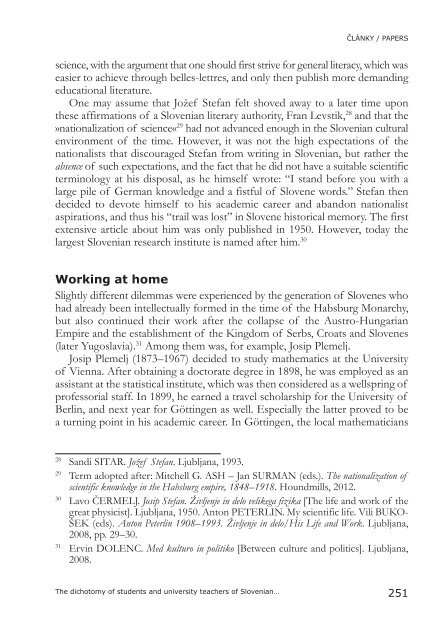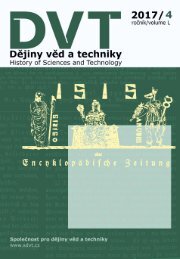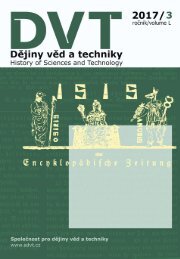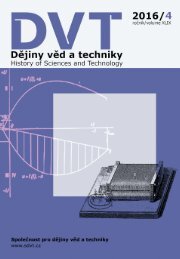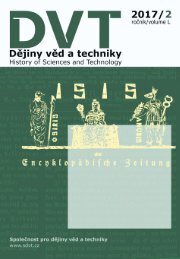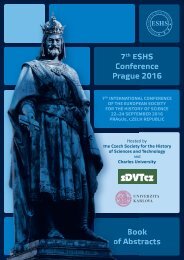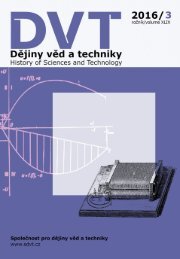Dějiny věd a techniky 2015, 4
Číslo je věnováno 7. mezinárodní konferenci Evropské společnosti pro dějiny vědy, která se konala 22.–24. září 2016 v Praze.
Číslo je věnováno 7. mezinárodní konferenci Evropské společnosti pro dějiny vědy, která se konala 22.–24. září 2016 v Praze.
You also want an ePaper? Increase the reach of your titles
YUMPU automatically turns print PDFs into web optimized ePapers that Google loves.
ČLÁNKY / PAPERS<br />
science, with the argument that one should first strive for general literacy, which was<br />
easier to achieve through belles-lettres, and only then publish more demanding<br />
educational literature.<br />
One may assume that Jožef Stefan felt shoved away to a later time upon<br />
these affirmations of a Slovenian literary authority, Fran Levstik, 28 and that the<br />
»nationalization of science« 29 had not advanced enough in the Slovenian cultural<br />
environment of the time. However, it was not the high expectations of the<br />
nationalists that discouraged Stefan from writing in Slovenian, but rather the<br />
absence of such expectations, and the fact that he did not have a suitable scientific<br />
terminology at his disposal, as he himself wrote: “I stand before you with a<br />
large pile of German knowledge and a fistful of Slovene words.” Stefan then<br />
decided to devote himself to his academic career and abandon nationalist<br />
aspirations, and thus his “trail was lost” in Slovene historical memory. The first<br />
extensive article about him was only published in 1950. However, today the<br />
largest Slovenian research institute is named after him. 30<br />
Working at home<br />
Slightly different dilemmas were experienced by the generation of Slovenes who<br />
had already been intellectually formed in the time of the Habsburg Monarchy,<br />
but also continued their work after the collapse of the Austro-Hungarian<br />
Empire and the establishment of the Kingdom of Serbs, Croats and Slovenes<br />
(later Yugoslavia). 31 Among them was, for example, Josip Plemelj.<br />
Josip Plemelj (1873–1967) decided to study mathematics at the University<br />
of Vienna. After obtaining a doctorate degree in 1898, he was employed as an<br />
assistant at the statistical institute, which was then considered as a wellspring of<br />
professorial staff. In 1899, he earned a travel scholarship for the University of<br />
Berlin, and next year for Göttingen as well. Especially the latter proved to be<br />
a turning point in his academic career. In Göttingen, the local mathematicians<br />
28<br />
Sandi SITAR. Jožef Stefan. Ljubljana, 1993.<br />
29<br />
Term adopted after: Mitchell G. ASH – Jan SURMAN (eds.). The nationalization of<br />
scientific knowledge in the Habsburg empire, 1848–1918. Houndmills, 2012.<br />
30<br />
Lavo ČERMELJ. Josip Stefan. Življenje in delo velikega fizika [The life and work of the<br />
great physicist]. Ljubljana, 1950. Anton PETERLIN. My scientific life. Vili BUKO-<br />
ŠEK (eds). Anton Peterlin 1908–1993. Življenje in delo/His Life and Work. Ljubljana,<br />
2008, pp. 29–30.<br />
31<br />
Ervin DOLENC. Med kulturo in politiko [Between culture and politics]. Ljubljana,<br />
2008.<br />
The dichotomy of students and university teachers of Slovenian…<br />
251


